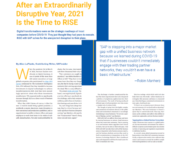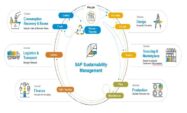Search Results for experience economy
Filter By
Browse By
- SAP Analytics and AI
- SAP Application Development and Integration
- All SAP Application Development and Integration
- SAP ABAP
- SAP ABAP Development Tools
- SAP ABAP Test Cockpit
- SAP API Management
- SAP BAPI
- SAP Basis
- SAP BRF
- SAP Business Application Studio
- SAP CMS
- SAP Design Studio
- SAP Development Tools
- SAP DevOps
- SAP EAI
- SAP EDI
- SAP Extension Suite
- SAP Fiori
- SAP Fiori Elements
- SAP Integration Suite
- SAP Low Code Application Development
- SAP Low Code Automation
- SAP Netweaver
- SAP Release Management
- SAP UI5
- SAP Web Application Server
- SAP Web IDE
- SAP Business Process Management
- SAP Center of Excellence
- SAP CIO
- SAP Customer Experience
- SAP Data and Data Management
- All SAP Data and Data Management
- SAP BW
- SAP BW/4HANA
- SAP Crystal Reporting
- SAP Data Archiving
- SAP Data Center
- SAP Data Governance
- SAP Data Integration
- SAP Data Migration
- SAP Data Quality
- SAP Data Services
- SAP Data Strategy
- SAP Data Visualization
- SAP Data Warehouse Cloud
- SAP DMS
- SAP Document Control
- SAP EIM
- SAP ETL
- SAP ETL Tools
- SAP HANA
- SAP HANA Administration
- SAP HANA Deployment Infrastructure
- SAP HANA Studio
- SAP Master Data
- SAP Master Data Governance
- SAP MDM
- SAP Enterprise Architect
- SAP Enterprise Asset Management
- SAP ERP
- SAP Finance
- All SAP Finance
- SAP Accounting
- SAP AR AP
- SAP Asset Accounting
- SAP Billing Systems
- SAP BPC
- SAP BRIM
- SAP Cash Management
- SAP Central Finance
- SAP Controlling
- SAP COPA
- SAP Cost Center Accounting
- SAP e-invoicing
- SAP FICO
- SAP Finance Automation
- SAP Financial Closing Cockpit
- SAP Financial Consolidation
- SAP Financial Planning
- SAP FX Risk
- SAP General Ledger
- SAP Global Tax Management
- SAP Hyperion
- SAP Order to Cash
- SAP Payment Processing
- SAP Profitability Analysis
- SAP Rebate Management
- SAP S/4HANA Finance
- SAP Universal Journal
- SAP Governance Risk and Compliance
- SAP Human Capital Management
- SAP Intelligent Technologies
- SAP Platform and Technology
- All SAP Platform and Technology
- SAP Business Technology Platform
- SAP Cloud Connector
- SAP Cloud Integration Platform
- SAP Cloud Migration
- SAP Cloud Platform
- SAP Cloud Providers
- SAP Cloud Strategy
- SAP Container Platform
- SAP Digital Asset Management
- SAP Digital Integration Hub
- SAP Digital Signature
- SAP HANA Enterprise Cloud
- SAP HEC
- SAP Hyperscalers
- SAP Infrastructure
- SAP Messaging
- SAP Smart Forms
- SAP Quality and Testing
- SAP Security
- SAP Spend Management
- SAP Supply Chain Management
- All SAP Supply Chain Management
- SAP APO
- SAP Asset Management
- SAP Business Network
- SAP Digital Manufacturing Cloud
- SAP Digital Twin
- SAP EWM
- SAP IBP
- SAP Inventory Management
- SAP Label Printing
- SAP Logistics
- SAP Manufacturing
- SAP Manufacturing Automation
- SAP MES
- SAP MII
- SAP MM
- SAP MRO
- SAP MRP
- SAP Order Management
- SAP Plant Maintenance
- SAP PLM
- SAP Production Planning
- SAP S&OP
- SAP SD
- SAP SPM
- SAP Supply Chain Planning
- SAP Track and Trace
- SAP Transportation Management
- SAP System Administration
329 results
-

Optimized Billing with Process Intelligence
Reading time: 10 mins
The digital economy is changing the way companies do business, including how they manage billing, which is a critical point of contact between an organization and its customers. A smooth invoicing process paves the way to prompt payment and a satisfied customer. If something goes wrong, however, organizations risk a costly cycle of phone calls,…
-

Engineering Circular Business
Reading time: 2 mins
As organizations work toward reducing waste and carbon emissions in the battle to fight the climate crisis, the importance of a circular economy cannot be understated. A circular economy not only minimizes waste generation, but it also encourages reuse of waste as raw material, drives economic growth, and promotes the use of local resources.
-

How Will Digital Transformation Impact Your SAP Financials Processes?
Reading time: 23 mins
In this Q&A session experts share strategic advice on how visionary companies optimize and automate finance processes to enable fast, accurate, and compliant financial decisions. If you missed the chat or need a refresher, we welcome you to view the online chat replay or read the edited transcript below. Meet the panelists: Tom Walker is the OpenText…...…
-
-

SAPPHIRE NOW 2017 Live Stream – Full Schedule
Reading time: 11 mins
Join us on SAPinsider Online for a virtual look at SAPPHIRE NOW 2017, with a sampling of key sessions and keynotes streaming live from Orlando. Starting Tuesday May 17, SAPPHIRE NOW 2017 coverage begins with SAP CEO Bill McDermott‘s keynote and continues through Thursday with selected sessions from Orlando. The full list of keynotes and sessions…
-

- SAP S/4HANA Finance
 Premium
Premium
The Evolution of the Finance Function
Reading time: 2 mins
The finance function has evolved into an organization that incorporates real-time, live, dynamic planning cycles and analytics into its processes in a shift toward becoming a strategic, value-added partner to the business. Thack Brown and Henner Schliebs of SAP examine in greater detail how a need for flexibility and speed is being met by advances…
-

Gain Insight and Take Action
Reading time: 6 mins
In a highly connected business-to-business (B2B) digital economy that values visibility and immediacy in the movement of goods and services along the extended supply chain, finance organizations need to play a central role in a procure-to-pay (P2P) value chain that connects buyers, suppliers, and even value-added partners such as banking institutions into a central hub.…
-

The Disruptive Dynamics of Customer Engagement
Reading time: 8 mins
Customer engagement has always been a challenge. In the digital economy, when customers have a wide range of engaging options before them, it’s even more difficult. Companies use a variety of methods to try to engage their customers on different social media platforms or web apps, but truly successful customer engagement needs to be a…
-
-

Becoming a Digital Enterprise Starts with Cloud
Reading time: 11 mins
Today’s enterprises have to contend with an uncomfortable truth: Legacy systems simply aren’t responsive enough to handle the explosive data growth or the rapid customization economy. In order to avoid being left behind, enterprises need to make the move to a more robust IT environment powered by a digital core. And for many, the most…
-

After an Extraordinarily Disruptive Year, 2021 Is the Time to RISE
Reading time: 7 mins
Digital transformations were on the strategic roadmaps of many companies before COVID-19 — they just thought they had years to execute. Business disruptions in 2020 like interrupted supply chains and cash flows have resulted in the emergence of a new economy, and moving capital expenses to operational expenses and liquidity have become urgent for many…
-

- SAP Sustainability
 Premium
Premium
Design for a Circular Business
Reading time: 7 mins
Organizations are increasingly facing the burden of solving or at least reducing the climate crisis. Businesses must consider new ways to reduce their carbon emissions and produce less waste. One of the leading solutions is to implement a circular economy. This involves reshaping the flow of materials around the world, creating items that can be…
Become a Member
Unlimited access to thousands of resources for SAP-specific expertise that can only be found here.
Upcoming Events
Your request has been successfully sent
